As if France doesn’t have enough to worry about at the moment with the presidential run-off between Emmanuel Macron and Marine Le Pen, there’s a new Michel Houellebecq novel in town. And, wouldn’t you know it, it’s set against the background of a French presidential election.
Houellebecq is by some distance France’s most successful contemporary novelist, boasting career sales of more than five million books in more than 30 languages. When he publishes something new it’s a major event in a country where literature enjoys far more cultural prominence than it does in most nations.
When his latest, Anéantir (Annihilation), appeared in France in January the initial print run was 300,000 for the whopping 730-page hardback, unthinkable numbers for a literary novel in Britain. Translated editions were published in Germany and Italy on the same day as the original (English-language readers will have to wait until later this year), while such was the anticipation in France that when a pirated digital version of the closely guarded manuscript began circulating a few weeks before official publication it was headline news.
Houellebecq is a rare thing: a heavyweight novelist who transcends literature to become a formidable cultural figure in his own right. In 2019, the year his last novel, Sérotonine, shifted more than 90,000 copies in its first two days, he starred alongside Gérard Depardieu in Thalasso, in which he and Dépardieu play themselves in a film about a visit to a health spa on the Normandy coast where they try to cope without cigarettes and alcohol. If that isn’t meta enough for you, in 2014 Houellebecq played himself in L’enlèvement de Michel Houellebecq (The Kidnapping of Michel Houellebecq), in which he, Michel Houellebecq, is kidnapped.
His pronouncements on talk shows and political discussion programmes as well as in written interviews are keenly anticipated and discussed in France and beyond. Much of what he has to say is pretty bog-standard right-wing whingeing – as long ago as 2002 Houellebecq was complaining about “the extent to which you can’t say anything any more”, ahead of two decades in which he has expressed a range of controversial opinions without interruption – but he retains the ear of a considerable segment of French society, from the barstool bore to the primetime news pundit.
In 2019 he wrote in praise of Donald Trump’s presidency in Harper’s Bazaar, a piece that also reiterated his distaste for the European Union.
“It’s my belief that we in Europe have neither a common language, nor common values, nor common interests, that, in a word, Europe doesn’t exist, and that it will never constitute a people or support a possible democracy simply because it doesn’t want to constitute a people,” he said. “In short, Europe is just a dumb idea that has gradually turned into a bad dream, from which we shall eventually wake up. Logically enough, President Trump was pleased about Brexit. Logically enough, so was I.”
Immigration and women are two of his favourite topics, and in December
last year he managed to combine both, commenting that “Migrants land in
Italy, in Spain and in Greece but they only pass through without helping to
sort out the demographic balance, even though the women of these countries are often very desirable”.
It’s easy to see why, from some angles, Houellebecq’s unbridled success since his 1998 debut novel Les Particules élémentaires, published in English as Atomised, is a little baffling. Even his most ardent admirers concede that he is no great prose stylist, while his protagonists are always tiresome, grumpy, frustrated, booze-addled middle-aged men living on microwave meals and cigarettes who spend a startling number of their waking hours thinking about fellatio.
Literature doesn’t get duller than when it’s filtered through an ennui-riddled boor with tobacco strands on his vest interrupting his bitter musing on the meaning of life with the occasional misogynistic sexual fantasy. Houellebecq’s novels are riddled with these tedious tossers, yet they’re still
more nuanced than most of his female characters, who are usually beautiful,
intelligent, accomplished at fellatio and inexplicably attracted to grumpy,
frustrated, booze-addled middle-aged men living on microwave meals and
cigarettes.
So what has turned Houellebecq into France’s most significant contemporary author? Where he unquestionably succeeds is in his remarkably prescient observations of the times in which we live. Soumission (Submission), for example, published in 2015, turns on a 2017 French presidential election between an outsider candidate who comes up against Marine Le Pen and wins. In the case of the novel, the candidate is not Emmanuel Macron but Muhammad Ben Abbes, fictional head of a fictional Muslim Brotherhood, whose victory prompts violence across France and culminates in the imposition of sharia law.
If tensions were not high enough in France at the time – Le Pen herself
described Soumission as “a fiction that could one day become reality” – the
novel was published on January 7 2015, the day 12 people were murdered by Islamist terrorists in the Paris offices of Charlie Hebdo. That week’s edition of the satirical magazine carried a cartoon on the cover depicting Houellebecq dressed as a wizard, smoking a cigarette and predicting, “In 2015 I’ll lose my teeth, in 2022 I’ll observe Ramadan”.
There was no direct link between Soumission and the attacks but the timing, to the day, was extraordinary. Houellebecq, whose friend the economist and broadcaster Bernard Maris was a victim of the shootings, was forced into hiding in the aftermath with round-the-clock security protection, while the French prime minister, Manuel Valls, insisted, “France is not Michel Houellebecq. It is not intolerance, hatred, fear.”
His 2001 novel Plateforme (Platform), is a salacious account of sex tourism in
south-east Asia that ends with a terrorist attack by Islamist extremists, a scenario eerily similar to the Bali bombing the following year. The novel
was published just two weeks before the September 11 attacks in the US.
A few days before the publication of Plateforme, a clearly drunk Houellebecq gave an interview to French television in which he declared Islam to be “the most stupid and murderous of all the religions”. This led to criminal charges for inciting racial hatred of which, despite asserting in court that “I have never displayed the least contempt for Muslims but I have as much contempt as ever for Islam”, he was acquitted.
For some the subsequent 9/11 attacks and the Bali bombing turned Houellebecq into a visionary whose finger was firmly and fearlessly on the
pulse of the modern world. For others he was just a boorish bigot.
Whatever your opinion of Houellebecq, his ability to write fiction that foresees events so accurately is extraordinary. It’s rare for a novelist to produce one book that turns out to be prescient, making Houellebecq’s strike rate much more than pure coincidence. In addition to Soumission and Plateforme, 2019’s Sérotonine was written before the gilets jaunes protests yet contained scenes of Normandy farmers clashing with police that could have come straight from subsequent news reports.
So, what of Anéantir? It’s set during a 2027 presidential election campaign where Le Pen has stepped away from public life but Éric Zemmour, a
candidate so far to the right that in this year’s election he made Le Pen look
almost a reasonable alternative, is a key figure. The incumbent president is
not named but is clearly Macron – hence Houellebecq’s prediction seems
to be that Macron wins in 2022 – while one of the main characters, Bruno
Juge, is obviously based on the current minister for the economy, Bruno Le
Maire. Obliged to stand down by the terms of the constitution, the president has groomed Juge as his successor, but only to keep the seat warm for his return, a plan that soon starts to unravel.
Much of this is viewed through the eyes of Juge’s chief adviser, Paul Raison, a man disillusioned with life, politics and relationships. So far, so Houellebecq. Yet the final section of the book becomes uncharacteristically
tender, even optimistic, as Raison’s closest personal relationships and marriage become sources of comfort in extremely trying circumstances.
Houellebecq, now 66 years old, has declared this to be his last novel. He has never been actively, or at least publicly, pro- any political party or figure. He’s been against stuff, or at least expressed a general disillusionment at what he sees as the decline of French society and values. In 2017 he said: “I am part of a France that votes Macron because I am too rich to vote Le Pen or Mélenchon,” while in 2019 he declared: “I am ready to vote for anyone as long as they propose to exit the European Union and Nato.”
Whichever way he has voted in this year’s election, is it too much to suggest that France’s great cynic, this scourge of progressives, this chronicler and predictor of decline and disaster, is seeing sunshine on the horizon, breaking through the clouds? And if so… should we be worried?
HOUELLEBECQ IN FIVE BOOKS
Whatever (Extension du domaine de la lutte), 1994
The sex-starved hero of Houellebecq’s debut novel – known only as Our Hero – wallows in a diet of masturbation, philosophical rumination and nausea, before being teamed up with an even less appealing sidekick to deliver a set of IT seminars
Atomised (Les Particules élémentaires), 1998
Half-brothers from a hippie mother take different, equally bleak paths. Cloning pioneer Michel removes sex and love from the process of reproduction; teacher Bruno becomes a sex addict and is institutionalised after trying to seduce a student
The Possibility of an Island (La Possibilité d’une île), 2005
Unhappy despite his wealth, controversial stand-up comic Daniel joins a cloning cult that promises him eternal life after his suicide. Surprise! His two clones, living in a post-apocalyptic future, are even less content
The Map and the Territory (La carte et le territoire), 2010
This Prix Goncourt-winning satire of the Paris art world features two
characters clearly based on Houellebecq – misanthropic artist Jed Martin and drunken writer Michel Houellebecq, whose murder Jed is drawn into
Serotonin (Sérotonine), 2019
Sex, suicide and sniper rifles in this tale of a depressed agricultural scientist
who finds himself unable to protect Normandy’s cheese farmers against globalisation and European Union bureaucracy




